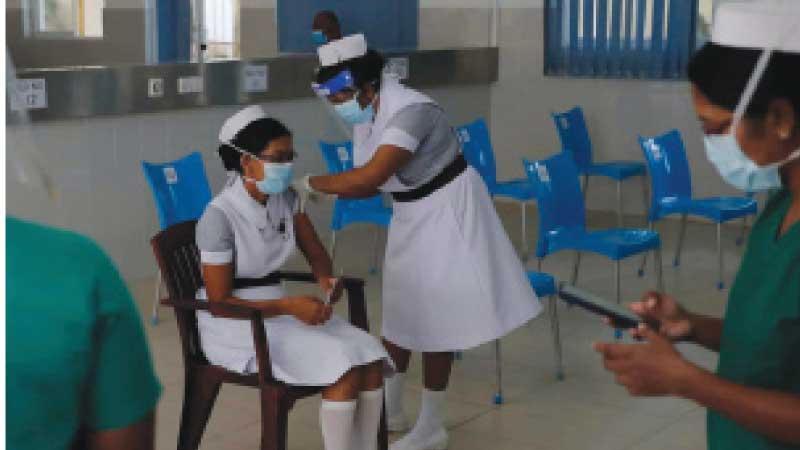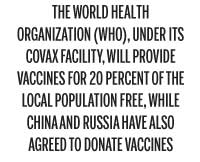
The State Pharmaceutical Corporation has signed an order with the Serum Institute of India (SII) for 10 million doses of Oxford-AstraZeneca vaccines, officials said on Friday.
The new development came after the agreement was approved by the Attorney General early last week. The agreement to procure the vaccines was signed between Sri Lanka’s State Pharmaceuticals Corporation and India’s Serum Institute, Ltd. Last month India, under its neigbourhood first policy, donated 500,000 doses of free vaccines that were given to frontline workers and the security forces. Oxford-AstraZeneca’s Covishield is manufactured at the Pune-based Serum Institute that has collaborated with Oxford University and pharmaceutical company AstraZeneca for making the vaccine.
The World Health Organization (WHO), under its COVAX facility, will provide vaccines for 20 percent of the local population free, while China and Russia have also agreed to donate vaccines.
Secretary to the State Ministry of Primary Health Care, Epidemics and Covid-19 Disease Control Dr. Amal Harsha de Silva told the media that the Government is exploring at the possibility of manufacturing Russia’s Sputnik V Covid vaccine.
“We will export vaccines, not import them soon,” he said.
According to statistics of the Epidemiology Unit at the Health Ministry, 263,779 people have been vaccinated by Friday since the launch of the program on January 29. The vaccination drive was launched at the National Institute of Infectious Diseases in the presence of State Minister of Primary Health Services, Pandemics and Covid Prevention, Dr Sudarshini Fernandopulle and Indian High Commissioner Gopal Baglay. Dr Ananda Wijewickrema of the hospital was the first recipient of the vaccine.
The Government also launched a website to collect public information to streamline the vaccination and primary healthcare delivery. It stated that the “personal information and the healthcare facility preferences will be used to improve the delivery and administration efficiency when the vaccines are available to the public”.
 There was resistance among some segments of the public against vaccination. In response, Primary Health Services, Pandemics and Covid Prevention Minister Dr. Sudharshani Fernandopulle called upon the public to assist the vaccine drive, adding that there was no need to fear the vaccine and be misled by false reports claiming adverse reactions to the Oxford-AstraZeneca Covishield vaccine.
There was resistance among some segments of the public against vaccination. In response, Primary Health Services, Pandemics and Covid Prevention Minister Dr. Sudharshani Fernandopulle called upon the public to assist the vaccine drive, adding that there was no need to fear the vaccine and be misled by false reports claiming adverse reactions to the Oxford-AstraZeneca Covishield vaccine.
She said no adverse effect had been reported from over 200,000 people who have been vaccinated.
Mass vaccination has begun in Colombo. An official said that vaccination of some public and private sector employees will be carried out during the weekend as they face issues regarding applying for leave from work.
“It is normal to catch fever or have body aches after receiving the vaccine. This means the body is reacting to it,” she said. UNPer Sudath Jayasundera last week, questioned the Government on the alleged contradiction in numbers related to the doses of the Covid-19 vaccine which are being purchased by the authorities.
“According to the Army Commander, a consignment of 500,000 doses of the Covid-19 vaccine is expected to arrive in the country last week. However, there is no indication of the origin of these vaccines,” the UNP stated in a press release, adding that, “there is a large shortfall of vaccine doses for the public.”
As the Government identified Members of Parliament as a vulnerable group as several MPs and ministers were tested positive for Covid-19, they were given the first round of vaccines. Members of the Opposition have expressed their objection to the move. MP Hesha Withanage has said he would not get the vaccine, “until the last citizen who needs to be vaccinated is vaccinated”.
New Covid-19 variant
Health experts warned of a possible spike in cases of Covid-19 with the detection of a new coronavirus variant in the country.
Sequencing of 92 SARS-CoV2 viruses received from January to the first week of February was carried out by the Allergy Immunology and Cell Biology Unit, Department of Immunology and Molecular Medicine, University of Sri Jayewardenepura. Sequencing was carried out from virus samples from Colombo, Avissawella, Ingiriya, Biyagama, Wattala, Mathugama, Mannar, Vavuniya and from several quarantine centres (returnees from overseas).
The virologists said, “While most virus lineages belonged to the previously circulating B.1.411 lineage (Sri Lankan lineage), a few viruses belonging to the B.1.1.7 (UK lineage) were detected from Colombo, Avissawella, Biyagama and Vavuniya and from a few people in the quarantine centres.”
“The B.1.1.7 is the rapidly transmissible variant circulating in the UK and many other countries. It is associated with a 50 percent higher transmissibility than the other SARS-CoV2 variants. This does not have any mutations that affect vaccine efficacy. Further analysis is under way.
“While it is possible that the B.1.1.7 was introduced from overseas, given the widespread detection of the virus in Sri Lanka, it is also possible that the circulating virus strain acquired these mutations de novo, as seen in many other countries, where there is intense transmission of the virus.”
Prof. Neelika Malavige of the Department of Immunology and Molecular Medicine, Faculty of Medical Sciences - University of Sri Jayewardenepura, said during a media interview that the sequencing was carried out after the second wave still spreading.
WHO’s chief scientist Dr Soumya Swaminathan said that scientists have found that the variants found in the UK and South Africa are much more infectious than other variants. “Scientists have studied this and have found that these variants tend to spread faster, they’re more transmissible or more infectious. That’s the worrying part. However, they do not seem to cause more severe illness or a higher death rate or any sort of different clinical manifestations,” she said, adding the new variants seem to behave much the same as the previous viruses.
“We know that testing, identifying those who are infectious, providing them supportive isolation, tracking and contact tracing, quarantining the contacts, making sure that people continue to comply with physical distancing, wearing a mask with avoiding crowded places, avoiding closed settings, washing hands and practising respiratory etiquette make a difference in bringing down transmission,” she said.
Meanwhile, the Government lifted an entry ban on people with recent travel history in the UK on Wednesday. The ban was imposed in January due to concerns over the discovery of the UK variant.
